Agency Theory and Stewardship Theory
VerifiedAdded on 2022/09/09
|12
|3288
|23
AI Summary
Contribute Materials
Your contribution can guide someone’s learning journey. Share your
documents today.
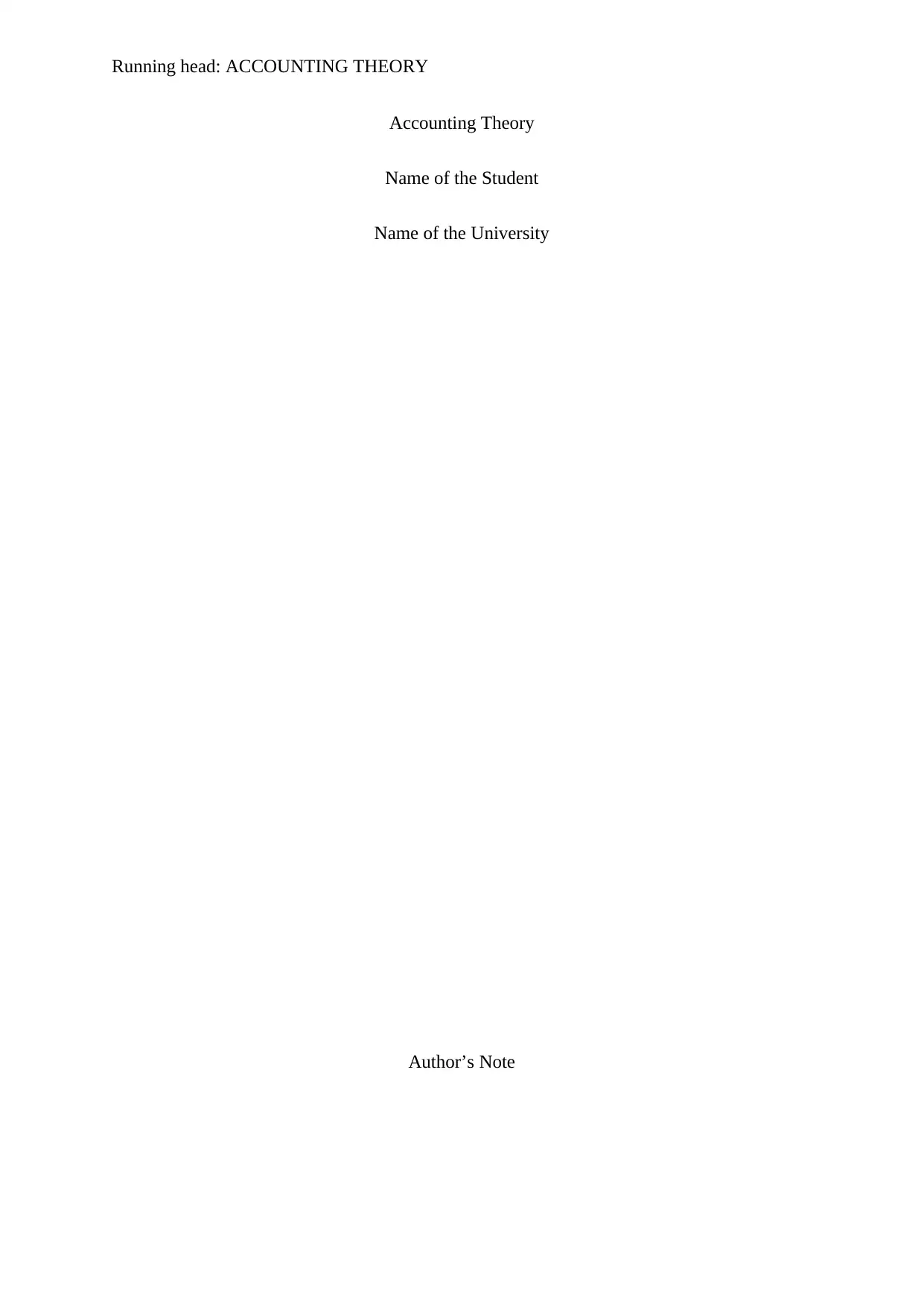
Running head: ACCOUNTING THEORY
Accounting Theory
Name of the Student
Name of the University
Author’s Note
Accounting Theory
Name of the Student
Name of the University
Author’s Note
Secure Best Marks with AI Grader
Need help grading? Try our AI Grader for instant feedback on your assignments.
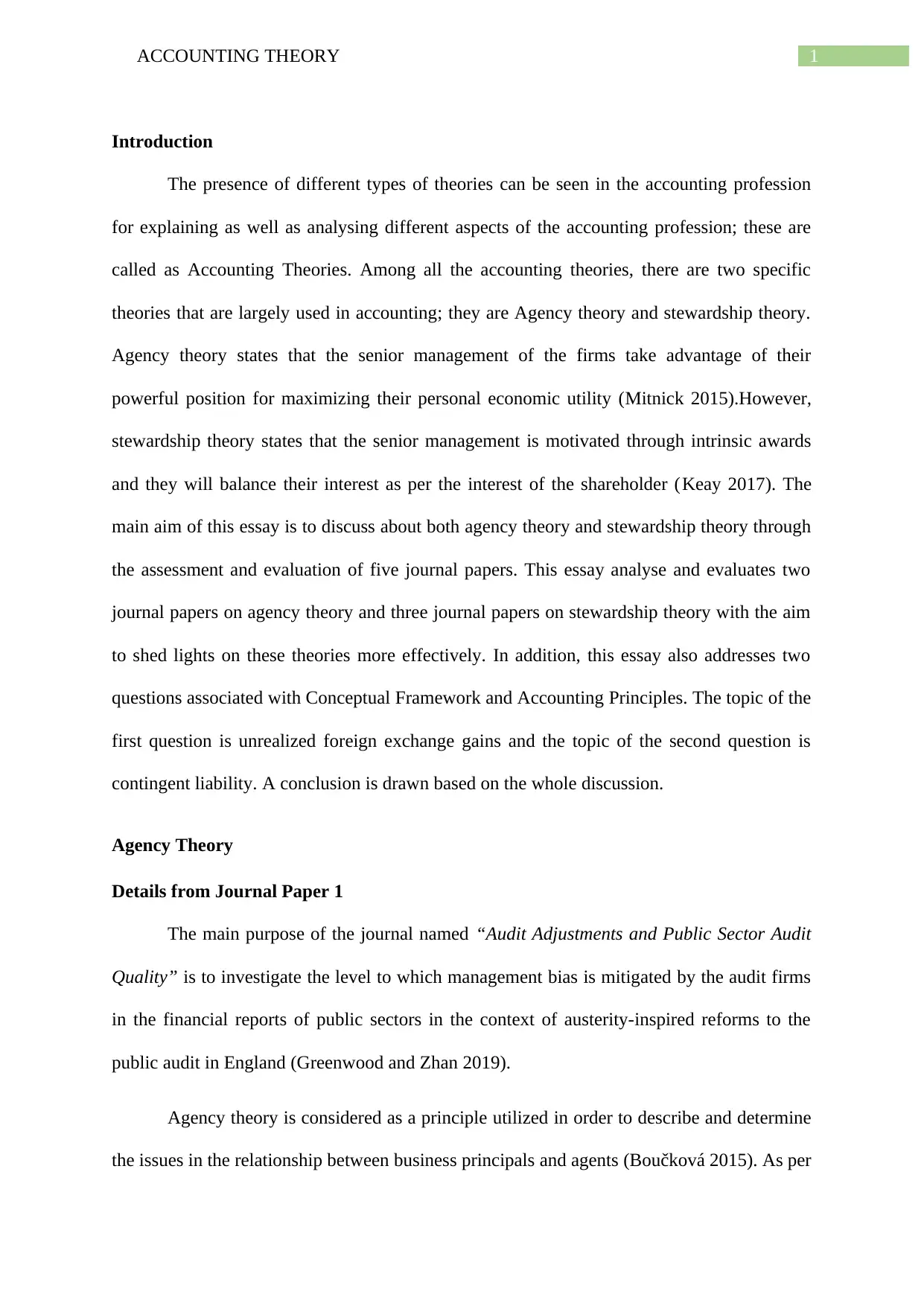
1ACCOUNTING THEORY
Introduction
The presence of different types of theories can be seen in the accounting profession
for explaining as well as analysing different aspects of the accounting profession; these are
called as Accounting Theories. Among all the accounting theories, there are two specific
theories that are largely used in accounting; they are Agency theory and stewardship theory.
Agency theory states that the senior management of the firms take advantage of their
powerful position for maximizing their personal economic utility (Mitnick 2015).However,
stewardship theory states that the senior management is motivated through intrinsic awards
and they will balance their interest as per the interest of the shareholder (Keay 2017). The
main aim of this essay is to discuss about both agency theory and stewardship theory through
the assessment and evaluation of five journal papers. This essay analyse and evaluates two
journal papers on agency theory and three journal papers on stewardship theory with the aim
to shed lights on these theories more effectively. In addition, this essay also addresses two
questions associated with Conceptual Framework and Accounting Principles. The topic of the
first question is unrealized foreign exchange gains and the topic of the second question is
contingent liability. A conclusion is drawn based on the whole discussion.
Agency Theory
Details from Journal Paper 1
The main purpose of the journal named “Audit Adjustments and Public Sector Audit
Quality” is to investigate the level to which management bias is mitigated by the audit firms
in the financial reports of public sectors in the context of austerity-inspired reforms to the
public audit in England (Greenwood and Zhan 2019).
Agency theory is considered as a principle utilized in order to describe and determine
the issues in the relationship between business principals and agents (Boučková 2015). As per
Introduction
The presence of different types of theories can be seen in the accounting profession
for explaining as well as analysing different aspects of the accounting profession; these are
called as Accounting Theories. Among all the accounting theories, there are two specific
theories that are largely used in accounting; they are Agency theory and stewardship theory.
Agency theory states that the senior management of the firms take advantage of their
powerful position for maximizing their personal economic utility (Mitnick 2015).However,
stewardship theory states that the senior management is motivated through intrinsic awards
and they will balance their interest as per the interest of the shareholder (Keay 2017). The
main aim of this essay is to discuss about both agency theory and stewardship theory through
the assessment and evaluation of five journal papers. This essay analyse and evaluates two
journal papers on agency theory and three journal papers on stewardship theory with the aim
to shed lights on these theories more effectively. In addition, this essay also addresses two
questions associated with Conceptual Framework and Accounting Principles. The topic of the
first question is unrealized foreign exchange gains and the topic of the second question is
contingent liability. A conclusion is drawn based on the whole discussion.
Agency Theory
Details from Journal Paper 1
The main purpose of the journal named “Audit Adjustments and Public Sector Audit
Quality” is to investigate the level to which management bias is mitigated by the audit firms
in the financial reports of public sectors in the context of austerity-inspired reforms to the
public audit in England (Greenwood and Zhan 2019).
Agency theory is considered as a principle utilized in order to describe and determine
the issues in the relationship between business principals and agents (Boučková 2015). As per
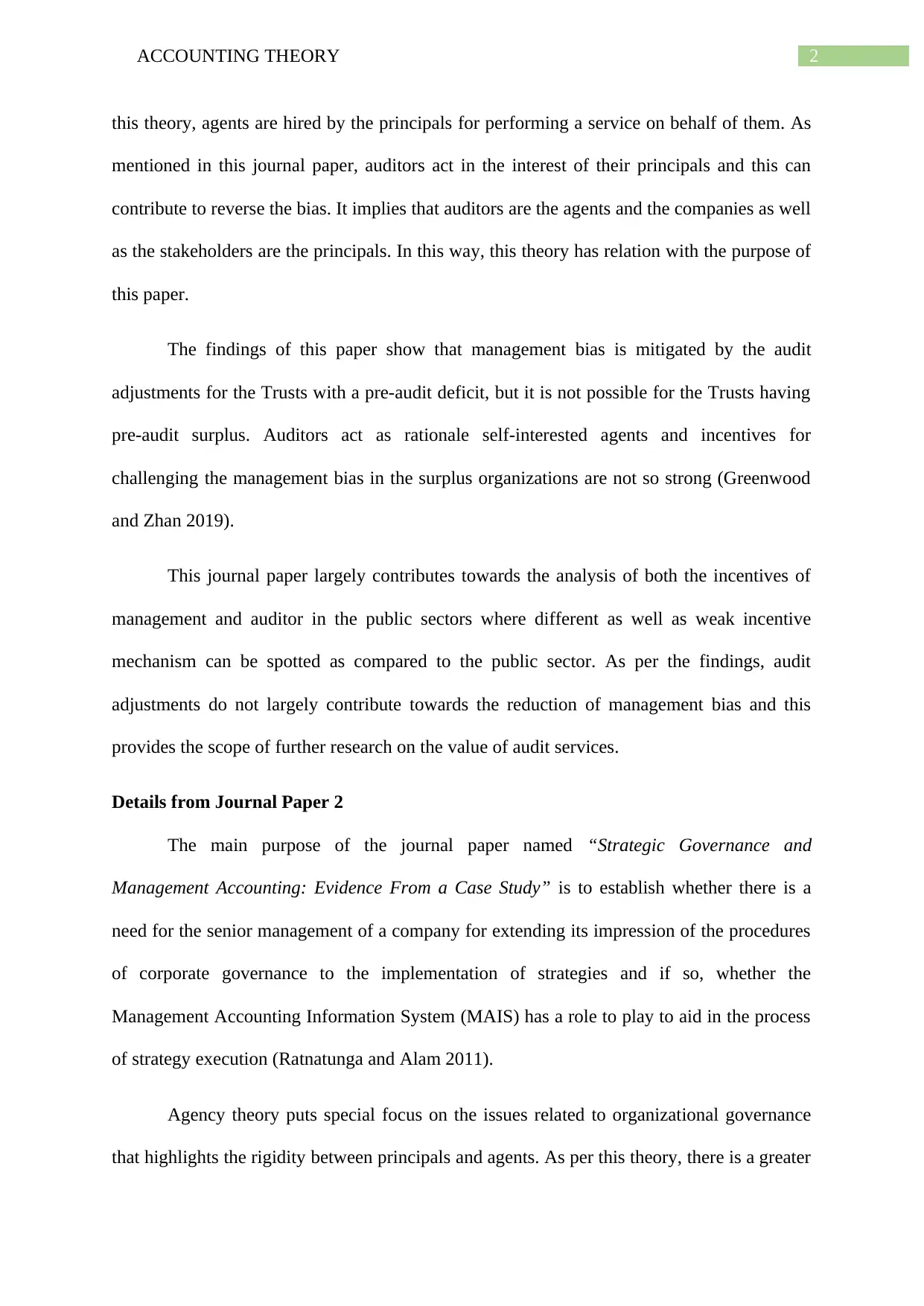
2ACCOUNTING THEORY
this theory, agents are hired by the principals for performing a service on behalf of them. As
mentioned in this journal paper, auditors act in the interest of their principals and this can
contribute to reverse the bias. It implies that auditors are the agents and the companies as well
as the stakeholders are the principals. In this way, this theory has relation with the purpose of
this paper.
The findings of this paper show that management bias is mitigated by the audit
adjustments for the Trusts with a pre-audit deficit, but it is not possible for the Trusts having
pre-audit surplus. Auditors act as rationale self-interested agents and incentives for
challenging the management bias in the surplus organizations are not so strong (Greenwood
and Zhan 2019).
This journal paper largely contributes towards the analysis of both the incentives of
management and auditor in the public sectors where different as well as weak incentive
mechanism can be spotted as compared to the public sector. As per the findings, audit
adjustments do not largely contribute towards the reduction of management bias and this
provides the scope of further research on the value of audit services.
Details from Journal Paper 2
The main purpose of the journal paper named “Strategic Governance and
Management Accounting: Evidence From a Case Study” is to establish whether there is a
need for the senior management of a company for extending its impression of the procedures
of corporate governance to the implementation of strategies and if so, whether the
Management Accounting Information System (MAIS) has a role to play to aid in the process
of strategy execution (Ratnatunga and Alam 2011).
Agency theory puts special focus on the issues related to organizational governance
that highlights the rigidity between principals and agents. As per this theory, there is a greater
this theory, agents are hired by the principals for performing a service on behalf of them. As
mentioned in this journal paper, auditors act in the interest of their principals and this can
contribute to reverse the bias. It implies that auditors are the agents and the companies as well
as the stakeholders are the principals. In this way, this theory has relation with the purpose of
this paper.
The findings of this paper show that management bias is mitigated by the audit
adjustments for the Trusts with a pre-audit deficit, but it is not possible for the Trusts having
pre-audit surplus. Auditors act as rationale self-interested agents and incentives for
challenging the management bias in the surplus organizations are not so strong (Greenwood
and Zhan 2019).
This journal paper largely contributes towards the analysis of both the incentives of
management and auditor in the public sectors where different as well as weak incentive
mechanism can be spotted as compared to the public sector. As per the findings, audit
adjustments do not largely contribute towards the reduction of management bias and this
provides the scope of further research on the value of audit services.
Details from Journal Paper 2
The main purpose of the journal paper named “Strategic Governance and
Management Accounting: Evidence From a Case Study” is to establish whether there is a
need for the senior management of a company for extending its impression of the procedures
of corporate governance to the implementation of strategies and if so, whether the
Management Accounting Information System (MAIS) has a role to play to aid in the process
of strategy execution (Ratnatunga and Alam 2011).
Agency theory puts special focus on the issues related to organizational governance
that highlights the rigidity between principals and agents. As per this theory, there is a greater
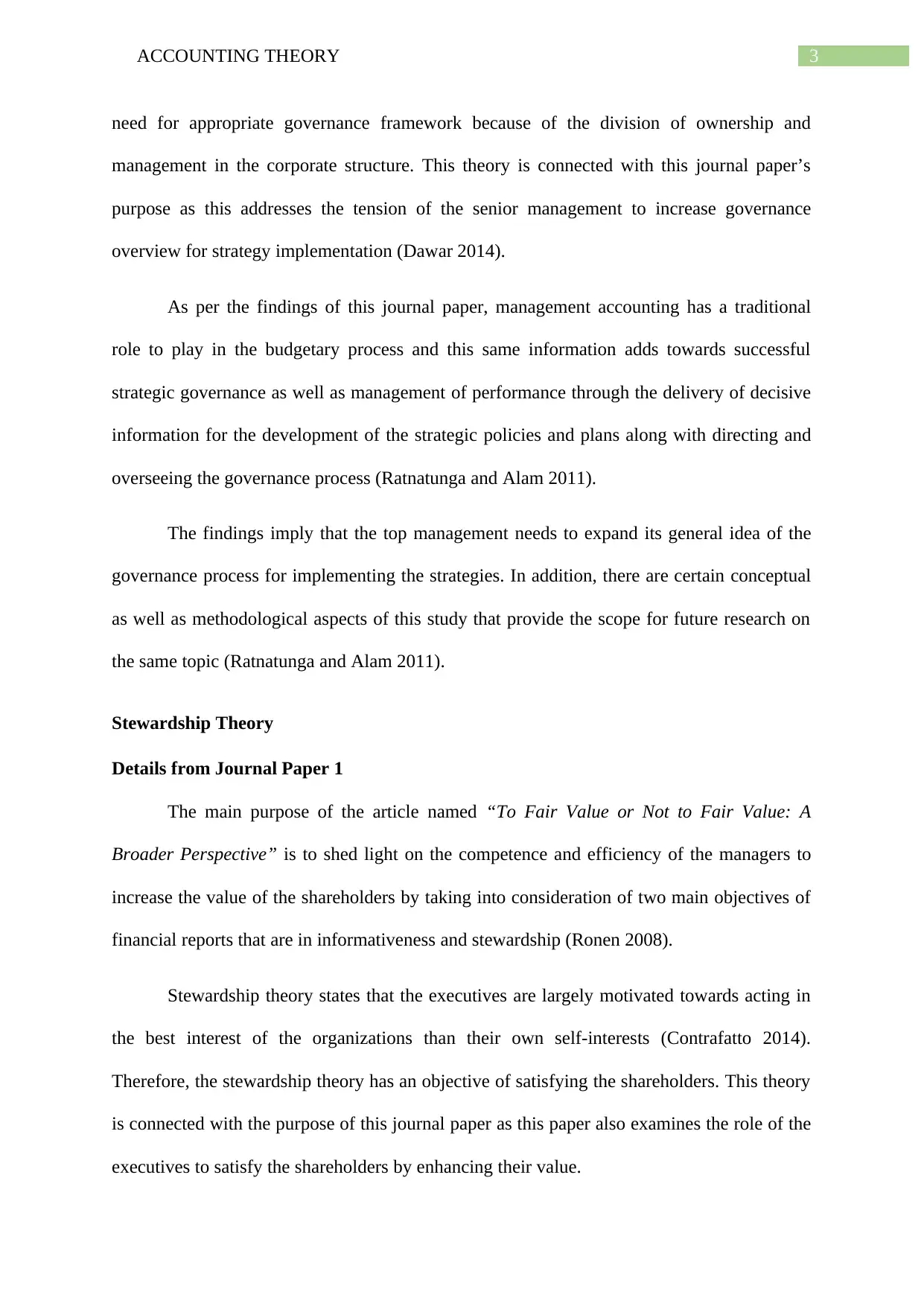
3ACCOUNTING THEORY
need for appropriate governance framework because of the division of ownership and
management in the corporate structure. This theory is connected with this journal paper’s
purpose as this addresses the tension of the senior management to increase governance
overview for strategy implementation (Dawar 2014).
As per the findings of this journal paper, management accounting has a traditional
role to play in the budgetary process and this same information adds towards successful
strategic governance as well as management of performance through the delivery of decisive
information for the development of the strategic policies and plans along with directing and
overseeing the governance process (Ratnatunga and Alam 2011).
The findings imply that the top management needs to expand its general idea of the
governance process for implementing the strategies. In addition, there are certain conceptual
as well as methodological aspects of this study that provide the scope for future research on
the same topic (Ratnatunga and Alam 2011).
Stewardship Theory
Details from Journal Paper 1
The main purpose of the article named “To Fair Value or Not to Fair Value: A
Broader Perspective” is to shed light on the competence and efficiency of the managers to
increase the value of the shareholders by taking into consideration of two main objectives of
financial reports that are in informativeness and stewardship (Ronen 2008).
Stewardship theory states that the executives are largely motivated towards acting in
the best interest of the organizations than their own self-interests (Contrafatto 2014).
Therefore, the stewardship theory has an objective of satisfying the shareholders. This theory
is connected with the purpose of this journal paper as this paper also examines the role of the
executives to satisfy the shareholders by enhancing their value.
need for appropriate governance framework because of the division of ownership and
management in the corporate structure. This theory is connected with this journal paper’s
purpose as this addresses the tension of the senior management to increase governance
overview for strategy implementation (Dawar 2014).
As per the findings of this journal paper, management accounting has a traditional
role to play in the budgetary process and this same information adds towards successful
strategic governance as well as management of performance through the delivery of decisive
information for the development of the strategic policies and plans along with directing and
overseeing the governance process (Ratnatunga and Alam 2011).
The findings imply that the top management needs to expand its general idea of the
governance process for implementing the strategies. In addition, there are certain conceptual
as well as methodological aspects of this study that provide the scope for future research on
the same topic (Ratnatunga and Alam 2011).
Stewardship Theory
Details from Journal Paper 1
The main purpose of the article named “To Fair Value or Not to Fair Value: A
Broader Perspective” is to shed light on the competence and efficiency of the managers to
increase the value of the shareholders by taking into consideration of two main objectives of
financial reports that are in informativeness and stewardship (Ronen 2008).
Stewardship theory states that the executives are largely motivated towards acting in
the best interest of the organizations than their own self-interests (Contrafatto 2014).
Therefore, the stewardship theory has an objective of satisfying the shareholders. This theory
is connected with the purpose of this journal paper as this paper also examines the role of the
executives to satisfy the shareholders by enhancing their value.
Secure Best Marks with AI Grader
Need help grading? Try our AI Grader for instant feedback on your assignments.
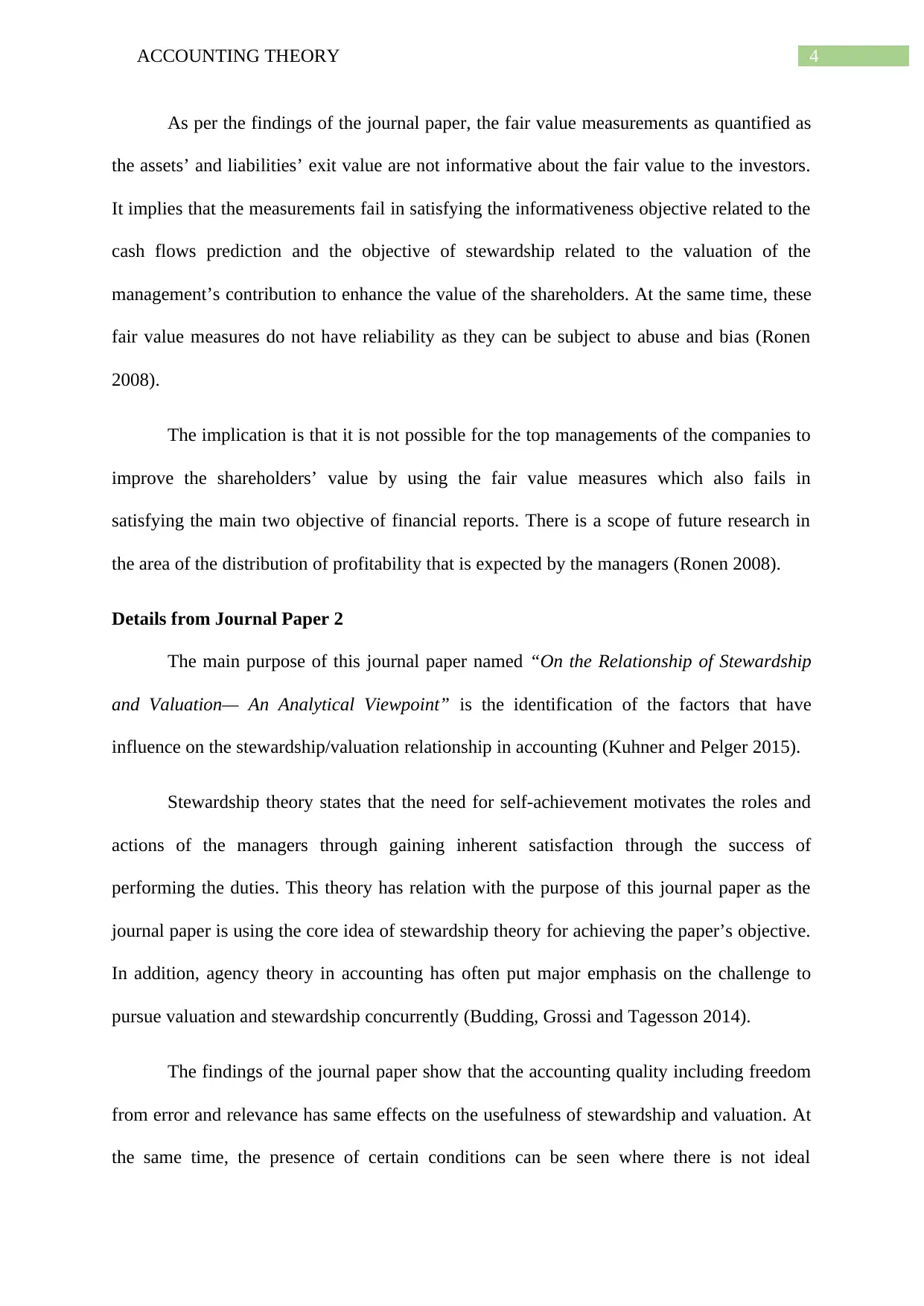
4ACCOUNTING THEORY
As per the findings of the journal paper, the fair value measurements as quantified as
the assets’ and liabilities’ exit value are not informative about the fair value to the investors.
It implies that the measurements fail in satisfying the informativeness objective related to the
cash flows prediction and the objective of stewardship related to the valuation of the
management’s contribution to enhance the value of the shareholders. At the same time, these
fair value measures do not have reliability as they can be subject to abuse and bias (Ronen
2008).
The implication is that it is not possible for the top managements of the companies to
improve the shareholders’ value by using the fair value measures which also fails in
satisfying the main two objective of financial reports. There is a scope of future research in
the area of the distribution of profitability that is expected by the managers (Ronen 2008).
Details from Journal Paper 2
The main purpose of this journal paper named “On the Relationship of Stewardship
and Valuation— An Analytical Viewpoint” is the identification of the factors that have
influence on the stewardship/valuation relationship in accounting (Kuhner and Pelger 2015).
Stewardship theory states that the need for self-achievement motivates the roles and
actions of the managers through gaining inherent satisfaction through the success of
performing the duties. This theory has relation with the purpose of this journal paper as the
journal paper is using the core idea of stewardship theory for achieving the paper’s objective.
In addition, agency theory in accounting has often put major emphasis on the challenge to
pursue valuation and stewardship concurrently (Budding, Grossi and Tagesson 2014).
The findings of the journal paper show that the accounting quality including freedom
from error and relevance has same effects on the usefulness of stewardship and valuation. At
the same time, the presence of certain conditions can be seen where there is not ideal
As per the findings of the journal paper, the fair value measurements as quantified as
the assets’ and liabilities’ exit value are not informative about the fair value to the investors.
It implies that the measurements fail in satisfying the informativeness objective related to the
cash flows prediction and the objective of stewardship related to the valuation of the
management’s contribution to enhance the value of the shareholders. At the same time, these
fair value measures do not have reliability as they can be subject to abuse and bias (Ronen
2008).
The implication is that it is not possible for the top managements of the companies to
improve the shareholders’ value by using the fair value measures which also fails in
satisfying the main two objective of financial reports. There is a scope of future research in
the area of the distribution of profitability that is expected by the managers (Ronen 2008).
Details from Journal Paper 2
The main purpose of this journal paper named “On the Relationship of Stewardship
and Valuation— An Analytical Viewpoint” is the identification of the factors that have
influence on the stewardship/valuation relationship in accounting (Kuhner and Pelger 2015).
Stewardship theory states that the need for self-achievement motivates the roles and
actions of the managers through gaining inherent satisfaction through the success of
performing the duties. This theory has relation with the purpose of this journal paper as the
journal paper is using the core idea of stewardship theory for achieving the paper’s objective.
In addition, agency theory in accounting has often put major emphasis on the challenge to
pursue valuation and stewardship concurrently (Budding, Grossi and Tagesson 2014).
The findings of the journal paper show that the accounting quality including freedom
from error and relevance has same effects on the usefulness of stewardship and valuation. At
the same time, the presence of certain conditions can be seen where there is not ideal
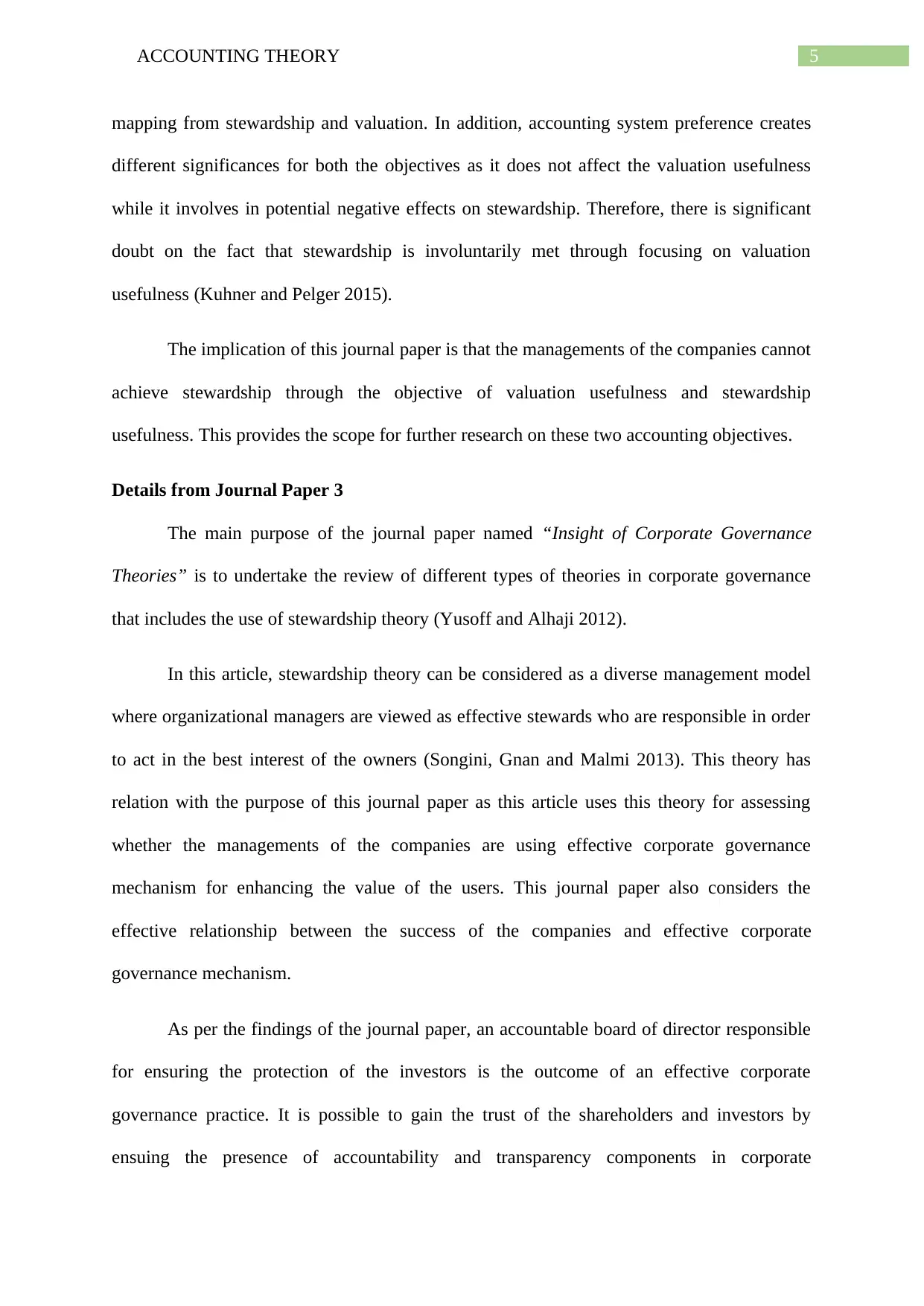
5ACCOUNTING THEORY
mapping from stewardship and valuation. In addition, accounting system preference creates
different significances for both the objectives as it does not affect the valuation usefulness
while it involves in potential negative effects on stewardship. Therefore, there is significant
doubt on the fact that stewardship is involuntarily met through focusing on valuation
usefulness (Kuhner and Pelger 2015).
The implication of this journal paper is that the managements of the companies cannot
achieve stewardship through the objective of valuation usefulness and stewardship
usefulness. This provides the scope for further research on these two accounting objectives.
Details from Journal Paper 3
The main purpose of the journal paper named “Insight of Corporate Governance
Theories” is to undertake the review of different types of theories in corporate governance
that includes the use of stewardship theory (Yusoff and Alhaji 2012).
In this article, stewardship theory can be considered as a diverse management model
where organizational managers are viewed as effective stewards who are responsible in order
to act in the best interest of the owners (Songini, Gnan and Malmi 2013). This theory has
relation with the purpose of this journal paper as this article uses this theory for assessing
whether the managements of the companies are using effective corporate governance
mechanism for enhancing the value of the users. This journal paper also considers the
effective relationship between the success of the companies and effective corporate
governance mechanism.
As per the findings of the journal paper, an accountable board of director responsible
for ensuring the protection of the investors is the outcome of an effective corporate
governance practice. It is possible to gain the trust of the shareholders and investors by
ensuing the presence of accountability and transparency components in corporate
mapping from stewardship and valuation. In addition, accounting system preference creates
different significances for both the objectives as it does not affect the valuation usefulness
while it involves in potential negative effects on stewardship. Therefore, there is significant
doubt on the fact that stewardship is involuntarily met through focusing on valuation
usefulness (Kuhner and Pelger 2015).
The implication of this journal paper is that the managements of the companies cannot
achieve stewardship through the objective of valuation usefulness and stewardship
usefulness. This provides the scope for further research on these two accounting objectives.
Details from Journal Paper 3
The main purpose of the journal paper named “Insight of Corporate Governance
Theories” is to undertake the review of different types of theories in corporate governance
that includes the use of stewardship theory (Yusoff and Alhaji 2012).
In this article, stewardship theory can be considered as a diverse management model
where organizational managers are viewed as effective stewards who are responsible in order
to act in the best interest of the owners (Songini, Gnan and Malmi 2013). This theory has
relation with the purpose of this journal paper as this article uses this theory for assessing
whether the managements of the companies are using effective corporate governance
mechanism for enhancing the value of the users. This journal paper also considers the
effective relationship between the success of the companies and effective corporate
governance mechanism.
As per the findings of the journal paper, an accountable board of director responsible
for ensuring the protection of the investors is the outcome of an effective corporate
governance practice. It is possible to gain the trust of the shareholders and investors by
ensuing the presence of accountability and transparency components in corporate
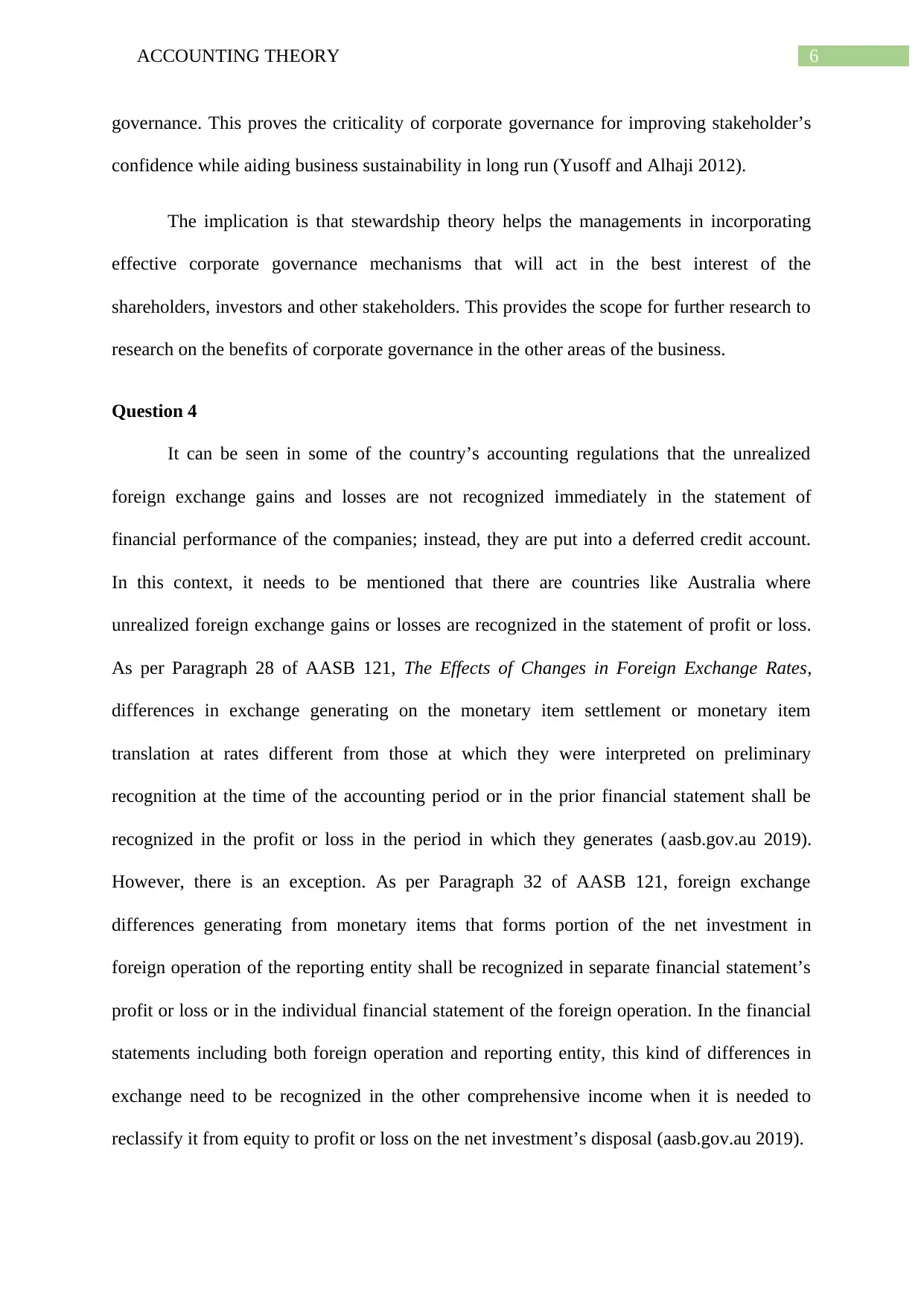
6ACCOUNTING THEORY
governance. This proves the criticality of corporate governance for improving stakeholder’s
confidence while aiding business sustainability in long run (Yusoff and Alhaji 2012).
The implication is that stewardship theory helps the managements in incorporating
effective corporate governance mechanisms that will act in the best interest of the
shareholders, investors and other stakeholders. This provides the scope for further research to
research on the benefits of corporate governance in the other areas of the business.
Question 4
It can be seen in some of the country’s accounting regulations that the unrealized
foreign exchange gains and losses are not recognized immediately in the statement of
financial performance of the companies; instead, they are put into a deferred credit account.
In this context, it needs to be mentioned that there are countries like Australia where
unrealized foreign exchange gains or losses are recognized in the statement of profit or loss.
As per Paragraph 28 of AASB 121, The Effects of Changes in Foreign Exchange Rates,
differences in exchange generating on the monetary item settlement or monetary item
translation at rates different from those at which they were interpreted on preliminary
recognition at the time of the accounting period or in the prior financial statement shall be
recognized in the profit or loss in the period in which they generates (aasb.gov.au 2019).
However, there is an exception. As per Paragraph 32 of AASB 121, foreign exchange
differences generating from monetary items that forms portion of the net investment in
foreign operation of the reporting entity shall be recognized in separate financial statement’s
profit or loss or in the individual financial statement of the foreign operation. In the financial
statements including both foreign operation and reporting entity, this kind of differences in
exchange need to be recognized in the other comprehensive income when it is needed to
reclassify it from equity to profit or loss on the net investment’s disposal (aasb.gov.au 2019).
governance. This proves the criticality of corporate governance for improving stakeholder’s
confidence while aiding business sustainability in long run (Yusoff and Alhaji 2012).
The implication is that stewardship theory helps the managements in incorporating
effective corporate governance mechanisms that will act in the best interest of the
shareholders, investors and other stakeholders. This provides the scope for further research to
research on the benefits of corporate governance in the other areas of the business.
Question 4
It can be seen in some of the country’s accounting regulations that the unrealized
foreign exchange gains and losses are not recognized immediately in the statement of
financial performance of the companies; instead, they are put into a deferred credit account.
In this context, it needs to be mentioned that there are countries like Australia where
unrealized foreign exchange gains or losses are recognized in the statement of profit or loss.
As per Paragraph 28 of AASB 121, The Effects of Changes in Foreign Exchange Rates,
differences in exchange generating on the monetary item settlement or monetary item
translation at rates different from those at which they were interpreted on preliminary
recognition at the time of the accounting period or in the prior financial statement shall be
recognized in the profit or loss in the period in which they generates (aasb.gov.au 2019).
However, there is an exception. As per Paragraph 32 of AASB 121, foreign exchange
differences generating from monetary items that forms portion of the net investment in
foreign operation of the reporting entity shall be recognized in separate financial statement’s
profit or loss or in the individual financial statement of the foreign operation. In the financial
statements including both foreign operation and reporting entity, this kind of differences in
exchange need to be recognized in the other comprehensive income when it is needed to
reclassify it from equity to profit or loss on the net investment’s disposal (aasb.gov.au 2019).
Paraphrase This Document
Need a fresh take? Get an instant paraphrase of this document with our AI Paraphraser
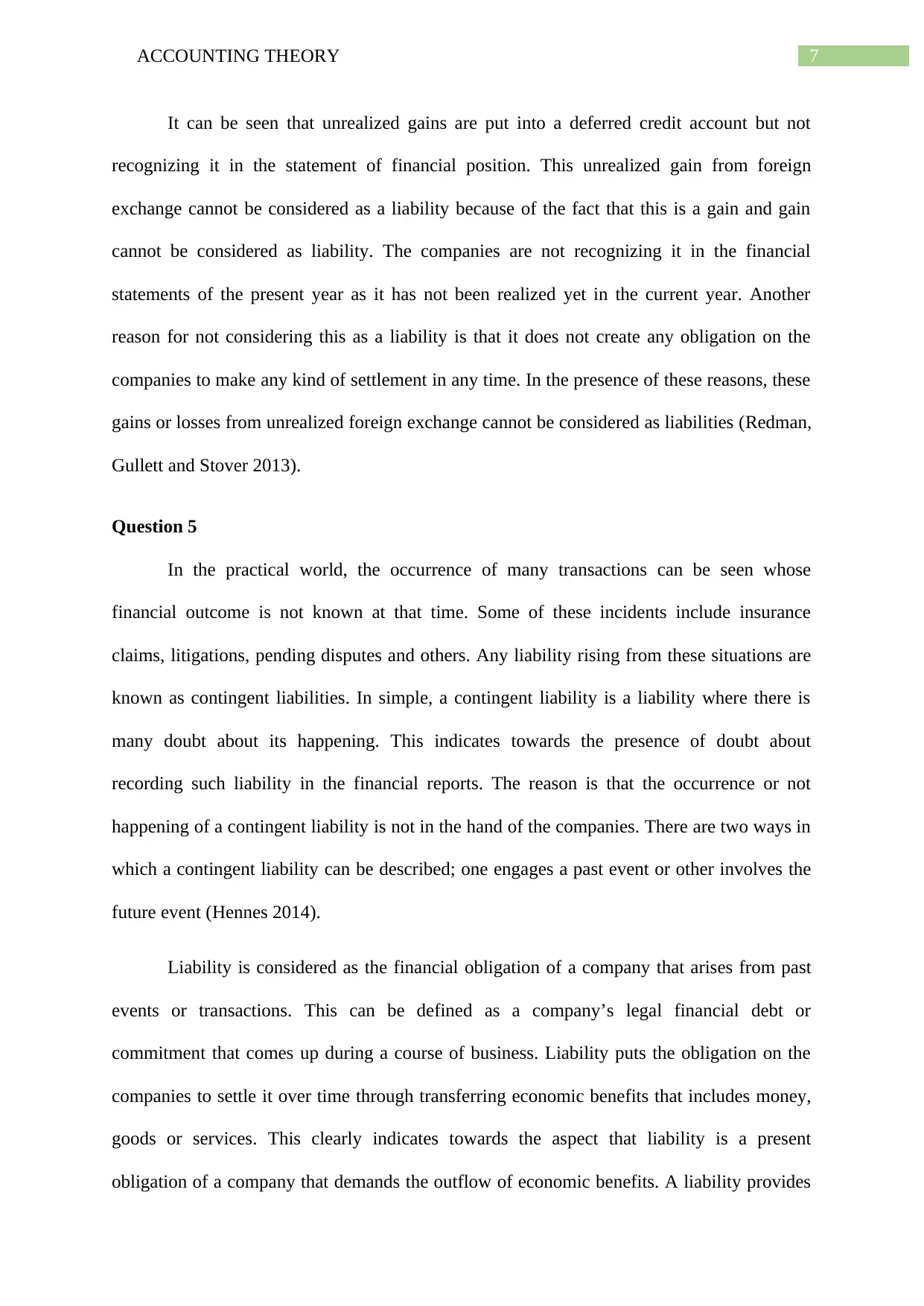
7ACCOUNTING THEORY
It can be seen that unrealized gains are put into a deferred credit account but not
recognizing it in the statement of financial position. This unrealized gain from foreign
exchange cannot be considered as a liability because of the fact that this is a gain and gain
cannot be considered as liability. The companies are not recognizing it in the financial
statements of the present year as it has not been realized yet in the current year. Another
reason for not considering this as a liability is that it does not create any obligation on the
companies to make any kind of settlement in any time. In the presence of these reasons, these
gains or losses from unrealized foreign exchange cannot be considered as liabilities (Redman,
Gullett and Stover 2013).
Question 5
In the practical world, the occurrence of many transactions can be seen whose
financial outcome is not known at that time. Some of these incidents include insurance
claims, litigations, pending disputes and others. Any liability rising from these situations are
known as contingent liabilities. In simple, a contingent liability is a liability where there is
many doubt about its happening. This indicates towards the presence of doubt about
recording such liability in the financial reports. The reason is that the occurrence or not
happening of a contingent liability is not in the hand of the companies. There are two ways in
which a contingent liability can be described; one engages a past event or other involves the
future event (Hennes 2014).
Liability is considered as the financial obligation of a company that arises from past
events or transactions. This can be defined as a company’s legal financial debt or
commitment that comes up during a course of business. Liability puts the obligation on the
companies to settle it over time through transferring economic benefits that includes money,
goods or services. This clearly indicates towards the aspect that liability is a present
obligation of a company that demands the outflow of economic benefits. A liability provides
It can be seen that unrealized gains are put into a deferred credit account but not
recognizing it in the statement of financial position. This unrealized gain from foreign
exchange cannot be considered as a liability because of the fact that this is a gain and gain
cannot be considered as liability. The companies are not recognizing it in the financial
statements of the present year as it has not been realized yet in the current year. Another
reason for not considering this as a liability is that it does not create any obligation on the
companies to make any kind of settlement in any time. In the presence of these reasons, these
gains or losses from unrealized foreign exchange cannot be considered as liabilities (Redman,
Gullett and Stover 2013).
Question 5
In the practical world, the occurrence of many transactions can be seen whose
financial outcome is not known at that time. Some of these incidents include insurance
claims, litigations, pending disputes and others. Any liability rising from these situations are
known as contingent liabilities. In simple, a contingent liability is a liability where there is
many doubt about its happening. This indicates towards the presence of doubt about
recording such liability in the financial reports. The reason is that the occurrence or not
happening of a contingent liability is not in the hand of the companies. There are two ways in
which a contingent liability can be described; one engages a past event or other involves the
future event (Hennes 2014).
Liability is considered as the financial obligation of a company that arises from past
events or transactions. This can be defined as a company’s legal financial debt or
commitment that comes up during a course of business. Liability puts the obligation on the
companies to settle it over time through transferring economic benefits that includes money,
goods or services. This clearly indicates towards the aspect that liability is a present
obligation of a company that demands the outflow of economic benefits. A liability provides
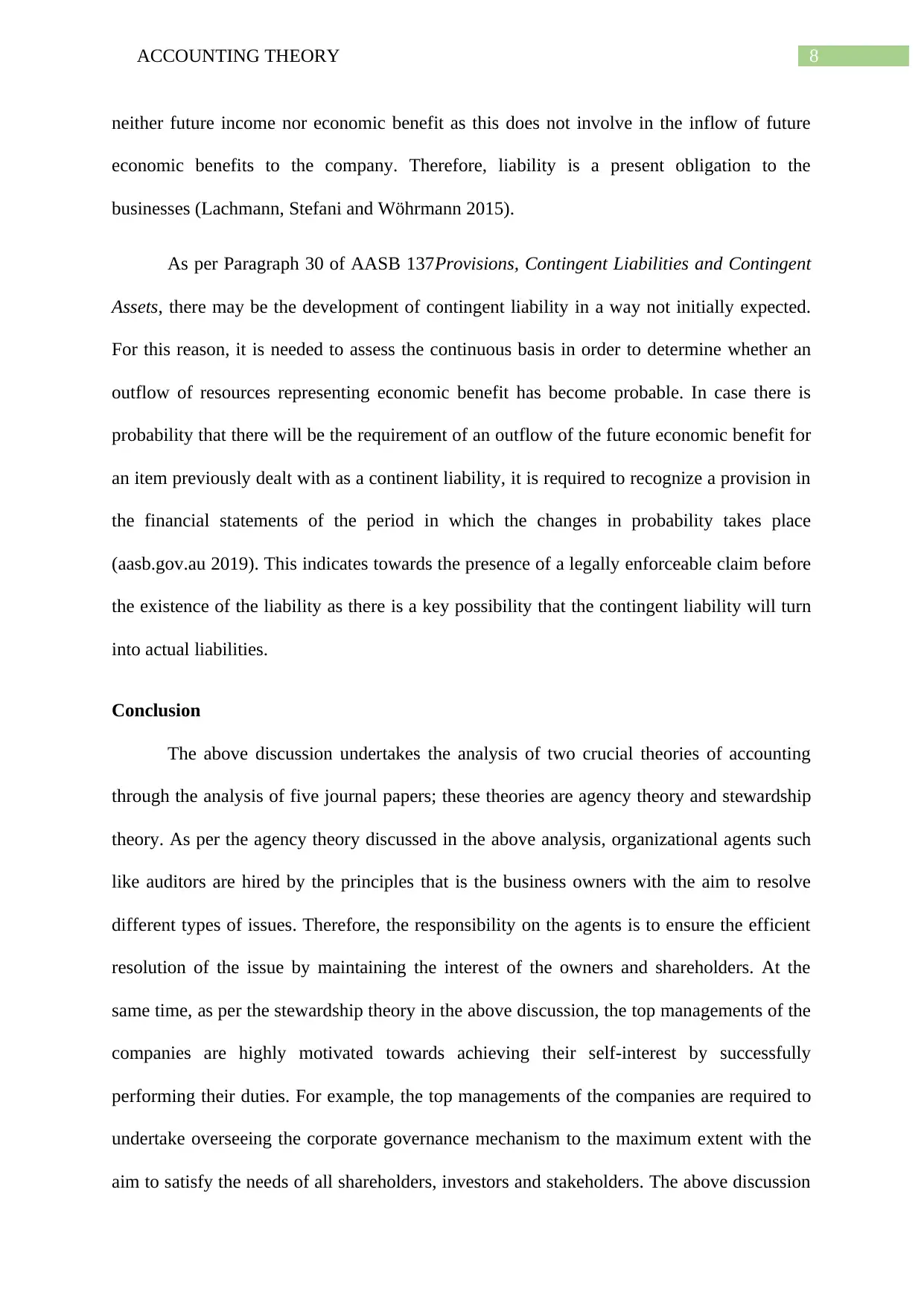
8ACCOUNTING THEORY
neither future income nor economic benefit as this does not involve in the inflow of future
economic benefits to the company. Therefore, liability is a present obligation to the
businesses (Lachmann, Stefani and Wöhrmann 2015).
As per Paragraph 30 of AASB 137Provisions, Contingent Liabilities and Contingent
Assets, there may be the development of contingent liability in a way not initially expected.
For this reason, it is needed to assess the continuous basis in order to determine whether an
outflow of resources representing economic benefit has become probable. In case there is
probability that there will be the requirement of an outflow of the future economic benefit for
an item previously dealt with as a continent liability, it is required to recognize a provision in
the financial statements of the period in which the changes in probability takes place
(aasb.gov.au 2019). This indicates towards the presence of a legally enforceable claim before
the existence of the liability as there is a key possibility that the contingent liability will turn
into actual liabilities.
Conclusion
The above discussion undertakes the analysis of two crucial theories of accounting
through the analysis of five journal papers; these theories are agency theory and stewardship
theory. As per the agency theory discussed in the above analysis, organizational agents such
like auditors are hired by the principles that is the business owners with the aim to resolve
different types of issues. Therefore, the responsibility on the agents is to ensure the efficient
resolution of the issue by maintaining the interest of the owners and shareholders. At the
same time, as per the stewardship theory in the above discussion, the top managements of the
companies are highly motivated towards achieving their self-interest by successfully
performing their duties. For example, the top managements of the companies are required to
undertake overseeing the corporate governance mechanism to the maximum extent with the
aim to satisfy the needs of all shareholders, investors and stakeholders. The above discussion
neither future income nor economic benefit as this does not involve in the inflow of future
economic benefits to the company. Therefore, liability is a present obligation to the
businesses (Lachmann, Stefani and Wöhrmann 2015).
As per Paragraph 30 of AASB 137Provisions, Contingent Liabilities and Contingent
Assets, there may be the development of contingent liability in a way not initially expected.
For this reason, it is needed to assess the continuous basis in order to determine whether an
outflow of resources representing economic benefit has become probable. In case there is
probability that there will be the requirement of an outflow of the future economic benefit for
an item previously dealt with as a continent liability, it is required to recognize a provision in
the financial statements of the period in which the changes in probability takes place
(aasb.gov.au 2019). This indicates towards the presence of a legally enforceable claim before
the existence of the liability as there is a key possibility that the contingent liability will turn
into actual liabilities.
Conclusion
The above discussion undertakes the analysis of two crucial theories of accounting
through the analysis of five journal papers; these theories are agency theory and stewardship
theory. As per the agency theory discussed in the above analysis, organizational agents such
like auditors are hired by the principles that is the business owners with the aim to resolve
different types of issues. Therefore, the responsibility on the agents is to ensure the efficient
resolution of the issue by maintaining the interest of the owners and shareholders. At the
same time, as per the stewardship theory in the above discussion, the top managements of the
companies are highly motivated towards achieving their self-interest by successfully
performing their duties. For example, the top managements of the companies are required to
undertake overseeing the corporate governance mechanism to the maximum extent with the
aim to satisfy the needs of all shareholders, investors and stakeholders. The above discussion
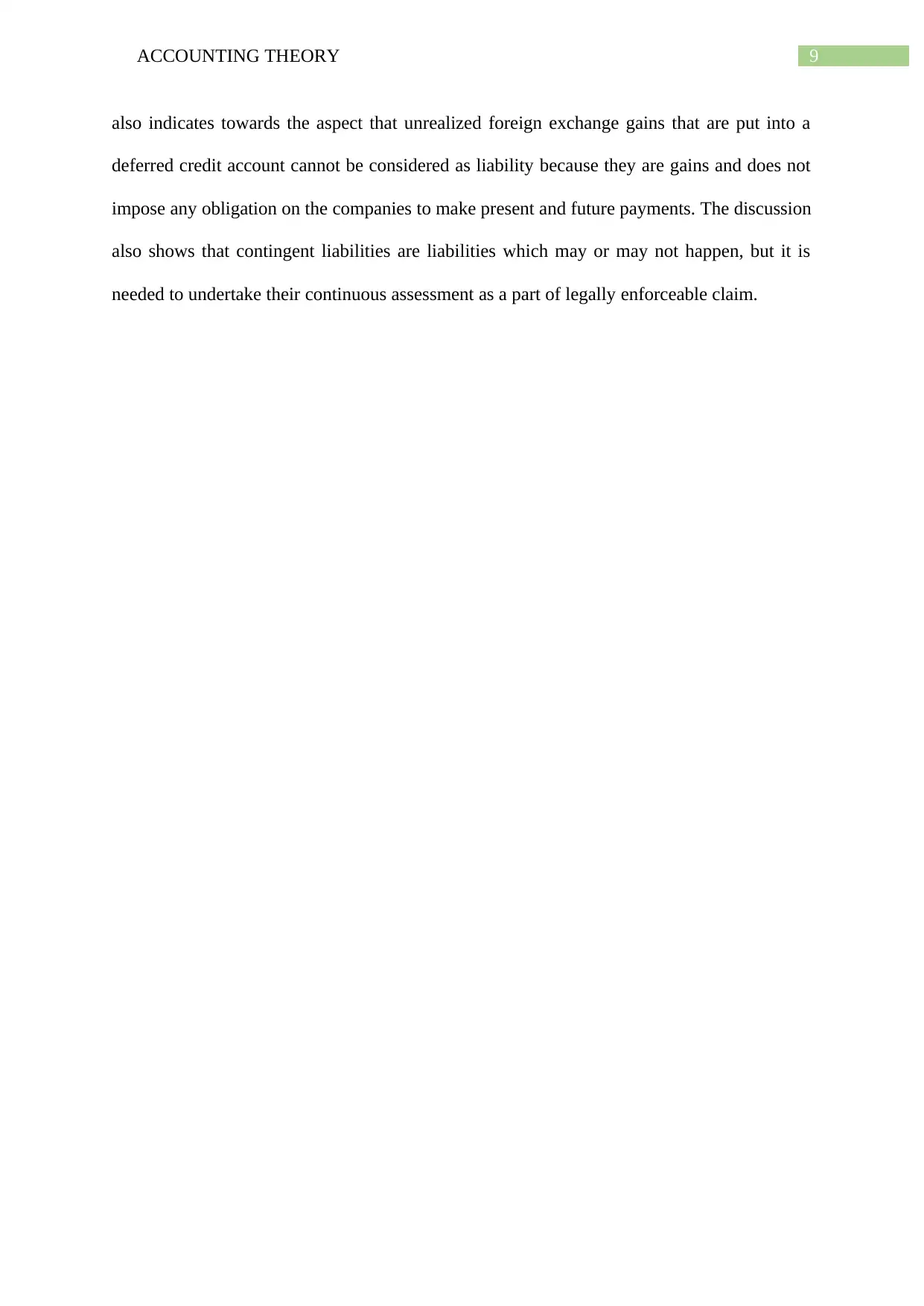
9ACCOUNTING THEORY
also indicates towards the aspect that unrealized foreign exchange gains that are put into a
deferred credit account cannot be considered as liability because they are gains and does not
impose any obligation on the companies to make present and future payments. The discussion
also shows that contingent liabilities are liabilities which may or may not happen, but it is
needed to undertake their continuous assessment as a part of legally enforceable claim.
also indicates towards the aspect that unrealized foreign exchange gains that are put into a
deferred credit account cannot be considered as liability because they are gains and does not
impose any obligation on the companies to make present and future payments. The discussion
also shows that contingent liabilities are liabilities which may or may not happen, but it is
needed to undertake their continuous assessment as a part of legally enforceable claim.
Secure Best Marks with AI Grader
Need help grading? Try our AI Grader for instant feedback on your assignments.
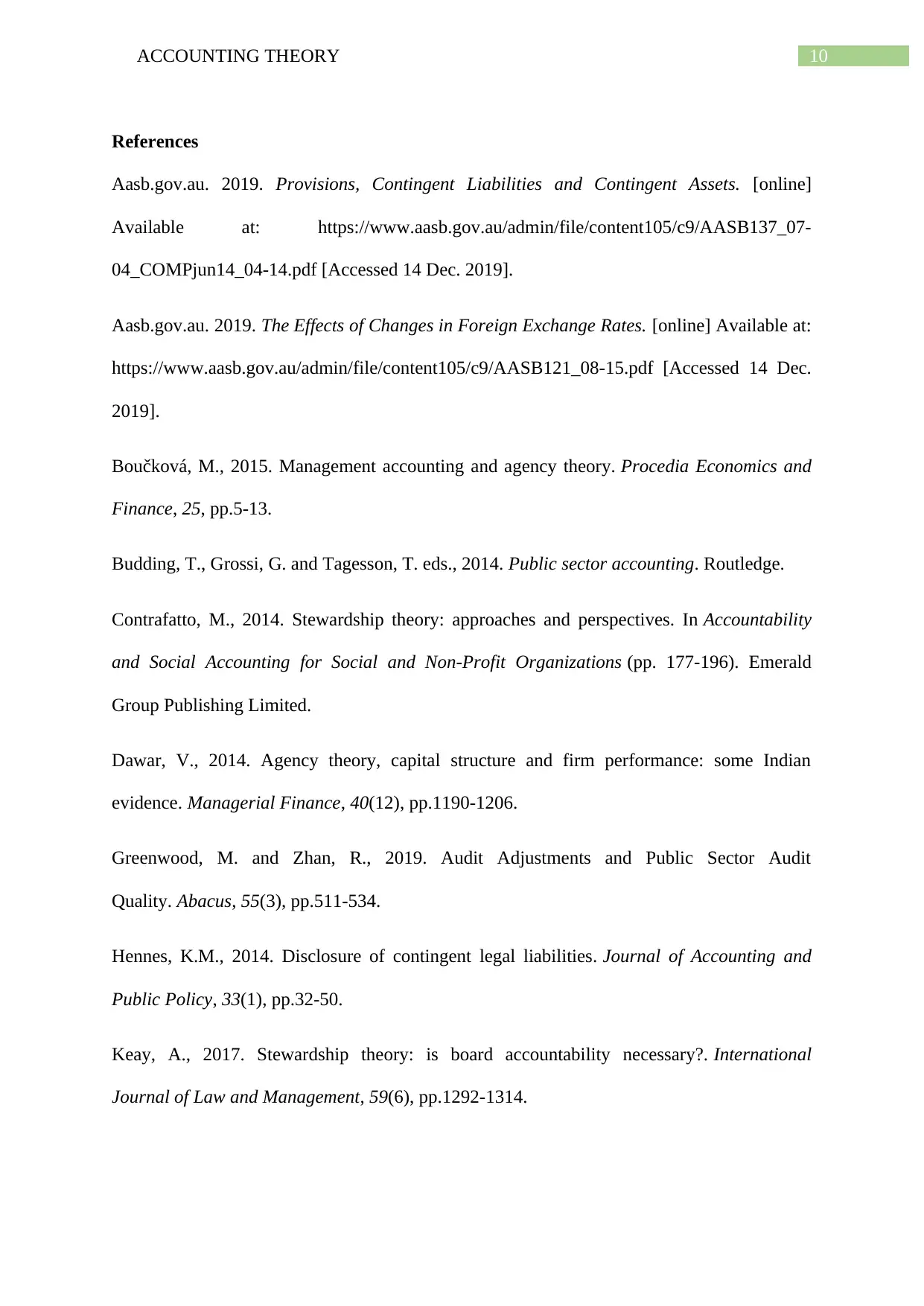
10ACCOUNTING THEORY
References
Aasb.gov.au. 2019. Provisions, Contingent Liabilities and Contingent Assets. [online]
Available at: https://www.aasb.gov.au/admin/file/content105/c9/AASB137_07-
04_COMPjun14_04-14.pdf [Accessed 14 Dec. 2019].
Aasb.gov.au. 2019. The Effects of Changes in Foreign Exchange Rates. [online] Available at:
https://www.aasb.gov.au/admin/file/content105/c9/AASB121_08-15.pdf [Accessed 14 Dec.
2019].
Boučková, M., 2015. Management accounting and agency theory. Procedia Economics and
Finance, 25, pp.5-13.
Budding, T., Grossi, G. and Tagesson, T. eds., 2014. Public sector accounting. Routledge.
Contrafatto, M., 2014. Stewardship theory: approaches and perspectives. In Accountability
and Social Accounting for Social and Non-Profit Organizations (pp. 177-196). Emerald
Group Publishing Limited.
Dawar, V., 2014. Agency theory, capital structure and firm performance: some Indian
evidence. Managerial Finance, 40(12), pp.1190-1206.
Greenwood, M. and Zhan, R., 2019. Audit Adjustments and Public Sector Audit
Quality. Abacus, 55(3), pp.511-534.
Hennes, K.M., 2014. Disclosure of contingent legal liabilities. Journal of Accounting and
Public Policy, 33(1), pp.32-50.
Keay, A., 2017. Stewardship theory: is board accountability necessary?. International
Journal of Law and Management, 59(6), pp.1292-1314.
References
Aasb.gov.au. 2019. Provisions, Contingent Liabilities and Contingent Assets. [online]
Available at: https://www.aasb.gov.au/admin/file/content105/c9/AASB137_07-
04_COMPjun14_04-14.pdf [Accessed 14 Dec. 2019].
Aasb.gov.au. 2019. The Effects of Changes in Foreign Exchange Rates. [online] Available at:
https://www.aasb.gov.au/admin/file/content105/c9/AASB121_08-15.pdf [Accessed 14 Dec.
2019].
Boučková, M., 2015. Management accounting and agency theory. Procedia Economics and
Finance, 25, pp.5-13.
Budding, T., Grossi, G. and Tagesson, T. eds., 2014. Public sector accounting. Routledge.
Contrafatto, M., 2014. Stewardship theory: approaches and perspectives. In Accountability
and Social Accounting for Social and Non-Profit Organizations (pp. 177-196). Emerald
Group Publishing Limited.
Dawar, V., 2014. Agency theory, capital structure and firm performance: some Indian
evidence. Managerial Finance, 40(12), pp.1190-1206.
Greenwood, M. and Zhan, R., 2019. Audit Adjustments and Public Sector Audit
Quality. Abacus, 55(3), pp.511-534.
Hennes, K.M., 2014. Disclosure of contingent legal liabilities. Journal of Accounting and
Public Policy, 33(1), pp.32-50.
Keay, A., 2017. Stewardship theory: is board accountability necessary?. International
Journal of Law and Management, 59(6), pp.1292-1314.
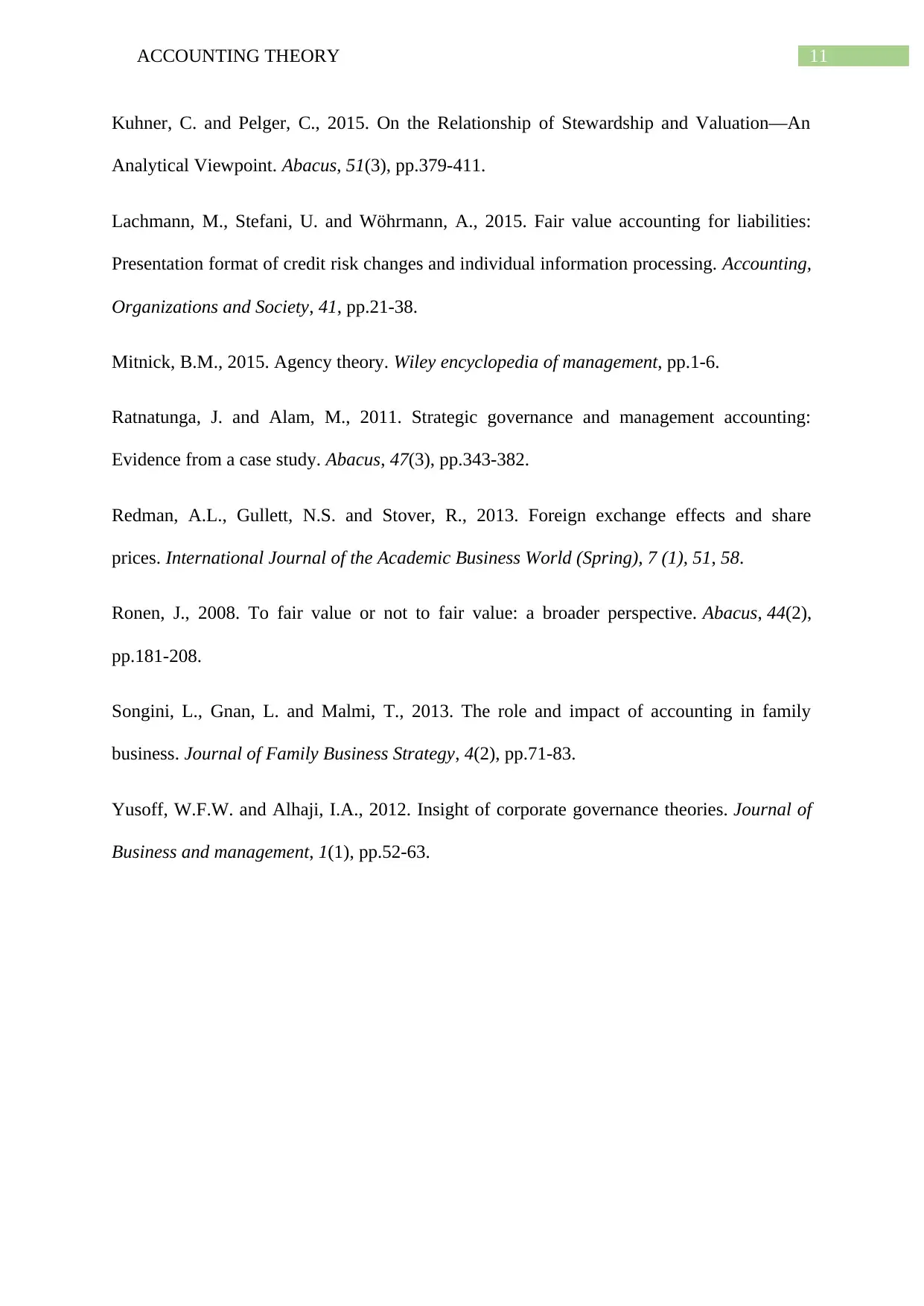
11ACCOUNTING THEORY
Kuhner, C. and Pelger, C., 2015. On the Relationship of Stewardship and Valuation—An
Analytical Viewpoint. Abacus, 51(3), pp.379-411.
Lachmann, M., Stefani, U. and Wöhrmann, A., 2015. Fair value accounting for liabilities:
Presentation format of credit risk changes and individual information processing. Accounting,
Organizations and Society, 41, pp.21-38.
Mitnick, B.M., 2015. Agency theory. Wiley encyclopedia of management, pp.1-6.
Ratnatunga, J. and Alam, M., 2011. Strategic governance and management accounting:
Evidence from a case study. Abacus, 47(3), pp.343-382.
Redman, A.L., Gullett, N.S. and Stover, R., 2013. Foreign exchange effects and share
prices. International Journal of the Academic Business World (Spring), 7 (1), 51, 58.
Ronen, J., 2008. To fair value or not to fair value: a broader perspective. Abacus, 44(2),
pp.181-208.
Songini, L., Gnan, L. and Malmi, T., 2013. The role and impact of accounting in family
business. Journal of Family Business Strategy, 4(2), pp.71-83.
Yusoff, W.F.W. and Alhaji, I.A., 2012. Insight of corporate governance theories. Journal of
Business and management, 1(1), pp.52-63.
Kuhner, C. and Pelger, C., 2015. On the Relationship of Stewardship and Valuation—An
Analytical Viewpoint. Abacus, 51(3), pp.379-411.
Lachmann, M., Stefani, U. and Wöhrmann, A., 2015. Fair value accounting for liabilities:
Presentation format of credit risk changes and individual information processing. Accounting,
Organizations and Society, 41, pp.21-38.
Mitnick, B.M., 2015. Agency theory. Wiley encyclopedia of management, pp.1-6.
Ratnatunga, J. and Alam, M., 2011. Strategic governance and management accounting:
Evidence from a case study. Abacus, 47(3), pp.343-382.
Redman, A.L., Gullett, N.S. and Stover, R., 2013. Foreign exchange effects and share
prices. International Journal of the Academic Business World (Spring), 7 (1), 51, 58.
Ronen, J., 2008. To fair value or not to fair value: a broader perspective. Abacus, 44(2),
pp.181-208.
Songini, L., Gnan, L. and Malmi, T., 2013. The role and impact of accounting in family
business. Journal of Family Business Strategy, 4(2), pp.71-83.
Yusoff, W.F.W. and Alhaji, I.A., 2012. Insight of corporate governance theories. Journal of
Business and management, 1(1), pp.52-63.
1 out of 12
Related Documents
Your All-in-One AI-Powered Toolkit for Academic Success.
+13062052269
info@desklib.com
Available 24*7 on WhatsApp / Email
![[object Object]](/_next/static/media/star-bottom.7253800d.svg)
Unlock your academic potential
© 2024 | Zucol Services PVT LTD | All rights reserved.
